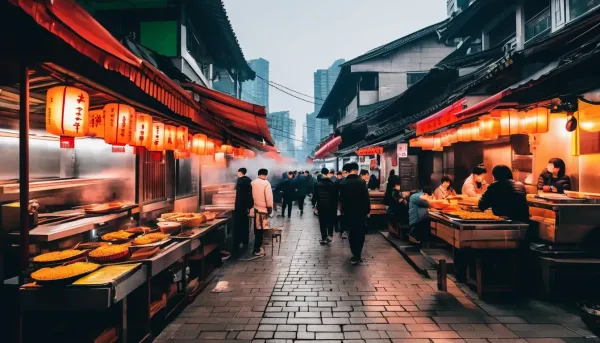Exploring Affordable Travel in China: A Guide for International Visitors
A decent tour in China is very affordable. China's allure as a budget-friendly travel destination extends beyond its iconic landmarks and culinary delights to encompass a cultural tapestry that captivates and inspires.

China, a land of ancient traditions and modern marvels, beckons travelers with its diverse landscapes, vibrant cultures, and affordable travel options. As an international visitor, exploring China offers a unique opportunity to immerse yourself in its rich heritage while enjoying budget-friendly accommodations, transportation, and culinary delights. Join us on a journey through China's attractions and practical tips for making the most of your travel budget in this captivating country.
Affordable Accommodations: Comfort on a Budget
Accommodation options in China cater to every budget, from luxurious hotels to budget-friendly hostels and guesthouses. Whether you prefer the convenience of city centers or the tranquility of rural retreats, finding affordable lodging is easily achievable.
In major cities like Beijing, Shanghai, and Guangzhou, international hotel chains and boutique accommodations offer competitive rates and modern amenities. For those seeking a cultural experience, traditional courtyard hotels (called "Siheyuan") in Beijing's hutongs or guesthouses in scenic towns like Yangshuo and Dali provide a glimpse into local life at economical prices.
Outside urban centers, hostels and guesthouses provide comfortable accommodations with shared facilities, ideal for budget-conscious travelers. Many establishments offer private rooms alongside dormitory-style lodging, ensuring flexibility and affordability for travelers of all preferences.
Convenient Transportation: Navigating China's Networks
China's transportation infrastructure is renowned for its efficiency and affordability, making it easy to explore both urban hubs and remote regions. Key modes of transportation include:
- High-Speed Trains: Connecting major cities with speeds up to 350 km/h (217 mph), China's high-speed rail network is ideal for efficient travel between destinations. Tickets are competitively priced, with discounts available for early bookings and off-peak travel times.
- Metro Systems: Major cities like Beijing, Shanghai, and Shenzhen boast extensive metro networks that provide convenient access to landmarks, shopping districts, and cultural attractions. Metro fares are affordable, with discounted rates for multi-trip passes and tourist cards.
- Buses and Coaches: Long-distance buses offer economical travel options for exploring regions beyond high-speed rail networks. Services range from standard coaches to luxury buses, with routes connecting cities, towns, and scenic areas throughout the country.
- Taxis and Ride-Sharing Apps: Taxis are readily available in urban centers, providing door-to-door convenience at reasonable rates. Ride-sharing apps like Didi Chuxing offer additional options for private car services, ensuring reliable transport with transparent pricing.
- Bicycle Rentals: Exploring cities on two wheels is a popular and cost-effective option in China. Bike-sharing programs, such as Mobike and Ofo, provide easy access to bicycles through mobile apps, allowing travelers to navigate urban streets and scenic paths independently.
Culinary Delights: Flavorful Adventures on a Budget
Sampling China's renowned cuisine is a highlight of any visit, with diverse regional flavors and affordable dining options available throughout the country. From bustling street food markets to cozy family-run restaurants, here's where to indulge in budget-friendly culinary experiences:
- Street Food: Wander through bustling night markets and street food stalls to discover local delicacies like jianbing (savory crepes), xiaolongbao (soup dumplings), and roujiamo (Chinese burgers). These affordable treats provide a taste of regional specialties and cultural heritage.
- Local Eateries: Neighborhood restaurants ("xiaochi dian") offer hearty meals at modest prices, featuring dishes such as hotpot ("huoguo"), stir-fried noodles ("chao mian"), and dumpling soups ("jiaozi tang"). Many establishments display menu items with accompanying pictures or English translations, ensuring ease of ordering for international visitors.
- Teahouses and Cafes: Relax in traditional teahouses ("chaguan") or modern cafes, where you can sample regional teas and freshly brewed "kafei" (coffee) while soaking in local ambiance. Teahouses often offer complimentary snacks, providing a cost-effective way to experience Chinese tea culture.
Exploring Cultural Treasures: Free and Low-Cost Attractions
China's cultural heritage is showcased through ancient landmarks, museums, and cultural performances, many of which offer free admission or nominal fees for entry:
- Historical Sites: Explore iconic landmarks such as the Great Wall, Forbidden City, and Terracotta Warriors, where entry fees are offset by the cultural significance and architectural splendor on display.
- Public Parks and Gardens: Stroll through tranquil parks like Beihai Park in Beijing and Yu Garden in Shanghai, which offer scenic views, historical pavilions, and cultural events throughout the year.
- Museums and Galleries: Many museums, including the National Museum of China and Shanghai Museum, offer free admission days or discounted rates for international visitors. Discover ancient artifacts, contemporary art exhibitions, and interactive displays that celebrate China's artistic legacy.
Shopping and Souvenirs: Bargain Finds and Local Markets
For memorable souvenirs and shopping experiences, China's markets and shopping districts offer a wealth of options at various price points:
- Street Markets: Bargain hunters will delight in exploring bustling markets such as Beijing's Silk Market, Xi'an's Muslim Quarter, and Guangzhou's Qingping Market, where vendors sell everything from silk scarves and handicrafts to local snacks and teas.
- Artisan Workshops: Visit traditional workshops and markets in towns renowned for craftsmanship, such as Jingdezhen (porcelain capital) and Hangzhou (silk production), where you can purchase authentic handmade goods directly from local artisans.
- Department Stores and Shopping Malls: Modern shopping centers in major cities offer a mix of international brands and domestic labels, with seasonal sales and discounts available on fashion, electronics, and household items.
Practical Tips for Budget Travel in China:
- Currency and Payment: Carry local currency (Renminbi, RMB) for cash transactions, while major credit cards are accepted in hotels, restaurants, and larger establishments. Mobile payment apps such as Alipay and WeChat Pay are widely used for convenience.
- Language Considerations: Learn basic Mandarin phrases and carry a translation app to facilitate communication, especially in rural areas where English proficiency may be limited.
- Seasonal Considerations: Plan travel during shoulder seasons (spring and autumn) for favorable weather conditions and fewer crowds, maximizing your budget and cultural experiences.
- Safety and Security: Exercise caution when exploring unfamiliar areas, safeguard personal belongings, and adhere to local customs and regulations to ensure a safe and enjoyable journey.
Conclusion: Embrace the Spirit of Affordable Travel in China
China's allure as a budget-friendly travel destination extends beyond its iconic landmarks and culinary delights to encompass a cultural tapestry that captivates and inspires. Whether you're traversing ancient city walls or savoring street food delicacies, each experience offers a glimpse into China's enduring heritage and dynamic evolution. Embrace the spirit of affordable travel in China, and embark on a transformative journey that blends exploration, discovery, and cultural immersion. Discover the magic of China while keeping within your budget, and create memories that will last a lifetime.



